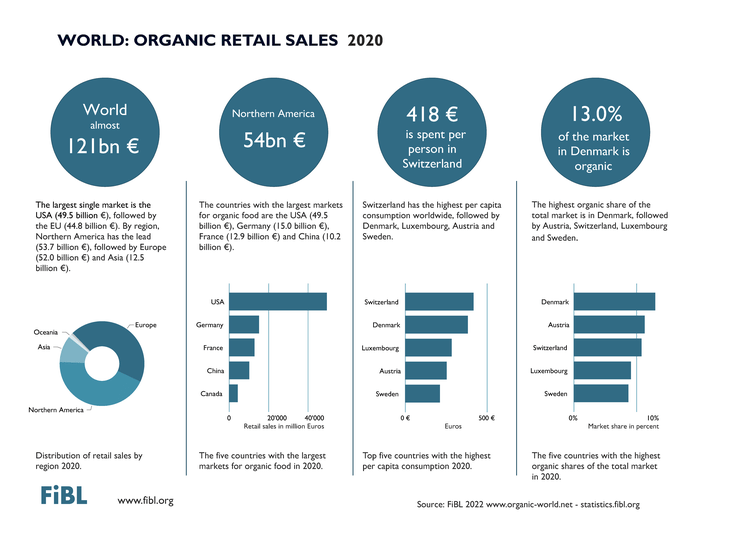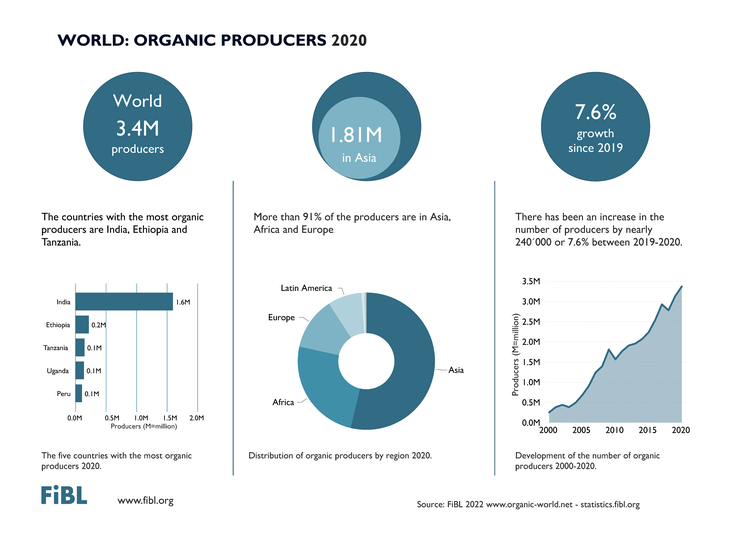Organic farmland and global organic market both continued to show strong growth worldwide, according to data from 190 countries (data as of the end of 2020). Published by FiBL and IFOAM – Organics International, the 23rd edition of “The World of Organic Agriculture” shows the positive trend seen in past years continued into 2020.

The global organic market continues to grow
Against the backdrop of the pandemic, the global market for organic food showed its highest growth ever in 2020, exceeding 120 billion euros – a total increase of 14 billion euros. The United States continued to be the leading market (49.5 billion euros), followed by Germany (15 billion euros) and France (12.7 billion euros).
The global market for organic food showed its highest growth ever in 2020, exceeding 120 billion euros
In 2020, many major markets showed extraordinarily strong growth rates; the German market, for example, grew by more than 22 percent. Swiss consumers spent the most on organic food (418 euros per capita in 2020), and Denmark continued to have the highest organic market share, with 13 percent of its total food market.

The global COVID-19 pandemic resulted in a significant increase in demand for organic products in many countries, but there were also challenges: “The effects of the pandemic are visible in retail sales data. As people stayed home and began to cook more often and health, environment and climate change have become big issues, organic retail sales increased rapidly. However, at the same time, in the food service sales decreased in many countries”, says Helga Willer, who is in charge of the yearbook at FiBL.

3.4 million organic producers worldwide
In 2020, 3.4 million organic producers were reported, an increase of 7.6 percent compared to 2019. India continued to be the country with the most organic producers (1.6 million). The majority of small-scale producers are certified in groups based on an internal control system.
Almost 75 million hectares were organically managed at the end of 2020
Steady increase of organic farmland
Almost 75 million hectares were organically managed at the end of 2020, representing a growth of 4.1 percent or 3 million hectares compared to 2019. Australia had the largest organic agricultural area (35.7 million hectares), followed by Argentina (4.5 million hectares) and Uruguay (2.7 million hectares). Organic area increased across all continents in 2020. Half of the global organic agricultural land is in Oceania (35.9 million hectares). Europe had the second largest area (17.1 million hectares), followed by Latin America (9.9 million hectares).

Ten percent or more of farmland is organic in 18 countries
In 2020, 1.6 percent of farmland around the world was organic. However, many countries have far higher shares: Liechtenstein had the largest organic share of total farmland (41.6 percent), followed by Austria (26.5 percent) and Estonia (22.4 percent). In 18 countries, 10 percent or more of all agricultural land is organic.
Organic area increased across all continents in 2020
Global organic data shows ongoing engagement with transparency in the organic sector
“Global organic statistics have proven useful for international development cooperation programs and supporting strategies for organic agriculture and markets, and they are crucial for monitoring the impact of these activities. This publication shows our ongoing engagement with transparency in the organic sector”, says Louise Luttikholt, Executive Director of IFOAM – Organics International.

Knut Schmidtke, Director of Research, Extension & Innovation at FiBL Switzerland, adds: “Organic agriculture secures our future and does so worldwide: the Yearbook underlines the international importance of organic agriculture for a sustainable as well as climate-adapted food policy and reflects people’s trust in organically produced food.”
This annual survey on global organic agriculture is supported by the Swiss State Secretariat for Economic Affairs (SECO), the Sustainability Fund of Coop Switzerland, and NürnbergMesse, organisers of the BIOFACH trade fair.
Sources:
- “The World of Organic Agriculture” – available to buy or order at shop.fibl.org, order number 1344.
Subscribe to Bio Eco Actual Newsletter and be up to date with the latest news from the Organic Sector
Bio Eco Actual, International Organic Newspaper
Read Bio Eco Actual

































[…] Quelle: Bio Eco Actual […]